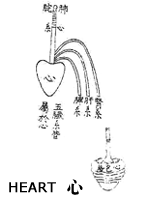Heart Functions
- Heart rules blood and blood vessels
- Heart rules spirit (shen)
- Sweat is the fluid of heart
- Heart opens into the tongue, and its brilliance is manifested in the face
 In TCM theory, the functions of the heart are different from those of the anatomical heart, as it is understood in western medicine. The heart organ represents a group of physiological functions. In addition to regulating the cardiovascular system, it is also responsible for maintaining the nervous system.
In TCM theory, the functions of the heart are different from those of the anatomical heart, as it is understood in western medicine. The heart organ represents a group of physiological functions. In addition to regulating the cardiovascular system, it is also responsible for maintaining the nervous system.Heart rules blood and blood vessels
The heart is the functional unit for regulating blood flow. Blood is transported inside the blood vessels around the entire body when the heart pumps. The heart, blood and blood vessels are united by their common activities. In TCM, this functional relationship is known as the "ruling" of the heart. Heart qi refers to the pumping actions of the heart. Abundant heart qi, sufficient heart blood and smooth blood vessels are all essential for a normal blood circulation. If heart qi is abundant and sufficient, the heart pumps at a normal pace, transporting blood smoothly inside the blood vessels. As a result, the body is able to obtain from blood the nutrients needed to sustain life. On the other hand, if heart qi and blood are low, blood cannot maintain an efficient flow in the blood vessels, disharmony will be developed. For example, a sluggish flow of heart blood will make individuals experiencing palpitations, chest stuffiness and even chest pain. Insufficient of heart blood may also induce mental or emotional problems.
Since pulse is associated with heart pumping, the condition of pulse can reflect whether the heart’s ruling on blood is normal or not. In case if the heart qi is abundant, and the blood circulates smoothly, the pulse will be in a regular rate, even and forceful, not too fast nor slow, around 4〜5 beats every breath. In case if the heart qi is deficiency, and the blood circulation is disturbed, the pulse will become uneven and weak.
Heart rules spirit (shen)
This is also known as "the heart stores spirit." In general, spirit refers to a person's vitality, which is reflected in the eyes, speech, reactions and overall appearance. Specifically, spirit refers to a person's mental, cognitive and intellectual abilities. Although these abilities belong to the brain in a modern sense, and are the reactions of brain to external things, but TCM holistic view claims that mental or emotional activities are the reflections of organ functioning, and are corresponding to the five organs. The heart takes charge of mental activities by mastering other organs and their physiological functions.
Physicians often check this aspect of heart ruling through a person’s vitality, consciousness, mental response, and sleep. If the "spirit ruling" is good, the individual will be full of vitality, have a clear and fast mind, and calm sleep. If there is heart disharmony that affects the spirit, for example insufficient blood and qi in the heart, there will be signs like poor sleep, dream-disturbed sleep, forgetfulness, restless, and slow thought processes or reactions; excess heat in the blood circulation can lead to irritability, delirium, and even coma or unconsciousness.
Sweat is the fluid of heart
Sweat comes from body fluids, which are an essential and integral part of blood. Blood is ruled by the heart and is the main fluid of this organ. Because sweat and blood are from the same source in TCM, sweating condition reflects heart functioning. Over-sweating is considered an exploitation of qi and heart blood, leading to symptoms such as palpitations. As a result, people who sweat abnormally may have a heart disharmony. If such sweating is spontaneous, the disharmony may due to a deficiency of heart yang. If it takes place at night, the disharmony may due to a deficiency of heart yin.Heart opens into the tongue, and its brilliance is manifested in the face
In TCM, conditions of internal organs can be revealed on the tissues and organs of body surface, both the tongue and face are windows for the heart and blood. The heart "opens into the tongue" because the heart meridian branches out connecting collateral to reach the root of tongue, and provides blood and qi to support the normal functioning of tongue, such as its taste and speech. The heart and tongue is closely corresponding with each other, both physiologically and pathologically. If heart function is normal, the tongue body is flexible, and can have fluent speech and sharp taste. Heart disharmony can cause the tongue to become deformed and discolored, for example, deficiency of heart blood will show a pale tongue; heart fire flaring up will cause a bright red tongue tip and even develop ulcer or sore; stasis of heart blood will have a dark purplish tongue, or has bleeding spot on it; heat entering the pericardium or phlegm misting the heart will cause tongue stiffness and speechless.
The "heart's brilliance to be manifested in the face," means facial complexion reveals the functional state of heart, and the rise and fall of its blood and qi. By observing the face, a lot can be learned about the heart. For example, if the heart’s blood and qi are abundant, individuals will have a bright complexion, and healthy red cheeks; when the heart has insufficient blood and qi, the facial complexion will become dull and pale; when individuals develop stasis of heart blood, their complexion will be purplish blue color; and over-heat blood will cause flushing of the face.
Pericardium is a membrane surrounding the heart. TCM regards the pericardium as a barrier of the heart, playing an important role in protecting the heart.
Click here to read more about the Heart Meridian


